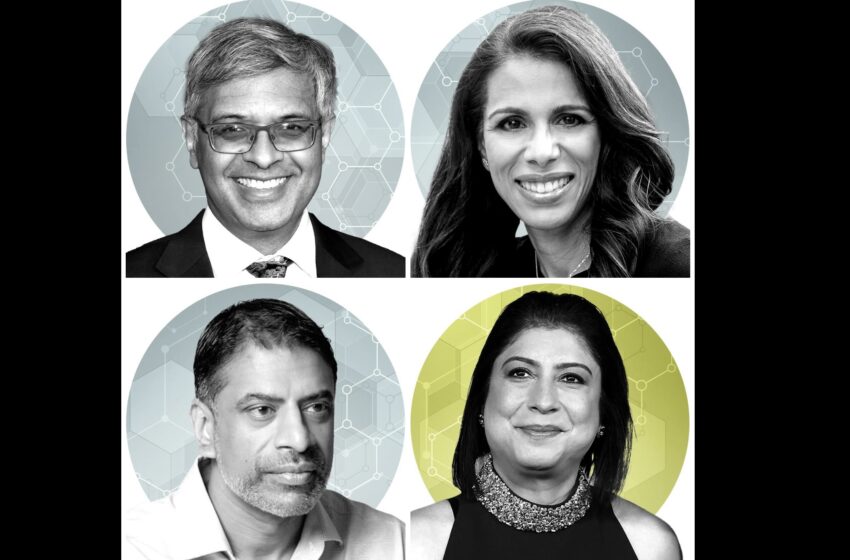10 Indian Americans on 2025 TIME100 Health list

Screenshot
Featured among a community of leaders – scientists, doctors, advocates, educators, and policy makers – changing the health of the world
By Arun Kumar
The 2025 TIME100 Health list highlights ten influential Indian-American healthcare experts shaping the future of global health by leading transformative work across biotechnology, digital health, global access, and public health policy.
The magazine describes TIME100 Health as a community of leaders from across industries—scientists, doctors, advocates, educators, and policy makers, among others—changing the health of the world.
READ: Three Indian American high schoolers among 2025 Flinn Scholars (April 24th, 2025)
“This year is unlike any other in the history of global health…. In a year of such upheaval, the TIME100 Health—100 people who are most influential in the world of health right now—looks a bit different,” write TIME editors on this year’s list.
Indian Americans on the list are: Jay Bhattacharya, Sumbul Desai, Vas Narasimhan, Reshma Kewalramani, Samarth Kulkarni, Shiv Rao, Anish Bhatnagar, Vinod Balachandran, Ronita Nath, and Suresh Ramalingam.
Jay Bhattacharya
As the new head of the National Institutes of Health (NIH), Dr. Jay Bhattacharya is now in charge of disbursing $35 billion a year, the largest amount of funding for biomedical research in the world.
Bhattacharya emerged during the pandemic as a critic of the government and its response, and gained notoriety for claiming that federal health officials were assessing the risk of the pandemic all wrong. As the new head of NIH, it’s likely similar questioning of how data is interpreted will permeate the types of grants the Institutes will fund, according to Time.
Sumbul Desai
Desai serves as vice president of Health at Apple, where she integrates technology and health. Collaborating with institutions like the American Heart Association and WHO, she utilizes data from Apple devices to enhance health monitoring and preventive care. “We want to make health approachable, not scary, and empower you with health information so you can be more proactive about staying healthy,” says Desai.
Dr. Sumbul Desai’s job is to think creatively about the different ways that technology can improve health. As Vice President of Health at Apple, she starts with strong data from studies the company conducts with academic institutes, the American Heart Association, and the World Health Organization to understand which metrics give the best window into overall health.
Vas Narasimhan
As CEO of Novartis, Narasimhan has been recognized for accelerating change in global health. Under his leadership, Novartis focuses on innovative treatments and expanding access to medicine worldwide.
More than one billion people in over 70 countries have received Novartis’ treatments for malaria largely at no profit to the company, Narasimhan says. Bringing his early-career visions of changemaking to fruition, he says, is “incredibly rewarding.”
Reshma Kewalramani
Kewalramani, is the CEO of a major U.S. biotech firm, Vertex Pharmaceuticals. Her journey from India to leading groundbreaking drug development exemplifies her dedication to science and medicine. “We only go after diseases where we understand the causal human biology,” she says. “We’re not interested in solving diseases in mice or rabbits.”
Samarth Kulkarni
As CEO of CRISPR Therapeutics, Kulkarni is pioneering gene-editing therapies for common diseases like diabetes and cancer. His work aims to make these treatments scalable and affordable. “We are moving to address common diseases like cardiovascular disease, autoimmune diseases, oncology, and diabetes that are big killers,” says Kulkarni.
Shiv Rao
Rao, a cardiologist and CEO of Abridge, addresses the administrative burdens in healthcare. His AI-driven solutions streamline documentation, allowing clinicians to focus more on patient care. “Abridge unburdens clinicians from the clerical work that crushes their souls, so they can focus on the person in front of them,” says Rao.
Anish Bhatnagar
As CEO of Soleno Therapeutics, Bhatnagar focuses on treatments for rare diseases like Prader-Willi syndrome. His work brings hope to patients with limited therapeutic options. “There appears to be, over time, a progressive improvement in hyperphagia, to the extent that these patients can live much more normal lives,” Bhatnagar says.
Ronita Nath
Nath, vice president of research at The Trevor Project, conducts pivotal studies on LGBTQ+ youth mental health. Her research informs policies and interventions to prevent suicide among queer youth across the US.
“My hope with this research is to show people from all backgrounds and beliefs that if you live in a state that has passed an anti-transgender law, youth in your home state are significantly more likely to take their own life. This is a scientific reality, and it is simply unacceptable,” she says.
Vinod Balachandran
Balachandran, a surgical oncologist and director of the Olayan Center for Cancer Vaccines at Memorial Sloan Kettering Cancer Center, is developing a personalized pancreatic cancer vaccine. His innovative approach aims to harness the immune system to combat this aggressive cancer. “Vaccines for cancer have just been so long sought after and are perhaps one of the most significant challenges in modern medicine,” he says.
Suresh Ramalingam
Ramalingam, executive director of Winship Cancer Institute of Emory University has presented groundbreaking results for a new lung cancer treatment. His work offers new hope for patients with advanced stages of the disease.

